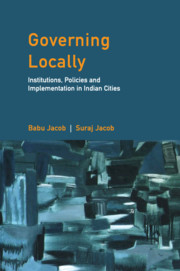Part III - Accountability
Published online by Cambridge University Press: 06 August 2021
Summary
Part II had mapped out the capacity of the local government using two core dimensions, administrative practices and organisation. Part III asks what shapes local capacity. It identifies two sources, the relationship of the local government to the devolving (state) government and the relationship of the local government to the public it serves. These are developed in separate chapters. Each is a form of ‘accountability’, that is, ‘a social “mechanism” … an institutional relation or arrangement in which an agent can be held to account by another agent or institution’ (Bovens 2010, 948).
Chapter 5 explores state–local relations. State–local relations vary considerably across states. Where local governments have more autonomy, they determine their own administrative practices and organisational arrangements. But more typically, state–local relations are such that local government autonomy is substantially compromised. The chapter details the processes through which autonomy is curtailed. It also discusses another aspect of state–local relations – the potential facilitation of local capacity through the state government's wider reach and resources.
Chapter 6 explores public participation in local governance processes. It argues that greater public participation enhances local government capacity for effective and just action. Unfortunately, despite surface variations across states, participation is mostly uniformly poor. The chapter discusses why this is the case, tracing it to two sources, the strength of social intermediation and expectations regarding the translation of participation into local government decisions and actions.
- Type
- Chapter
- Information
- Governing LocallyInstitutions, Policies and Implementation in Indian Cities, pp. 139 - 140Publisher: Cambridge University PressPrint publication year: 2021



